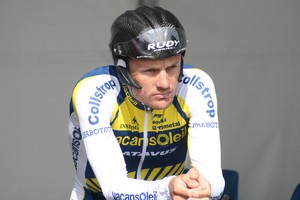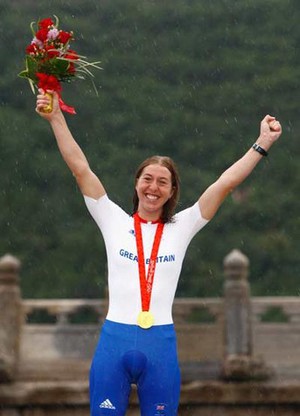Beware: Eating disorders can destroy lifes
Category: Training&Food
 Even when an athlete does well, like when Baden Cooke won the green jersey at the Tour de France, people are telling them that ”if they only lost a couple of kilos, they could be up there on GC and not only win stages. They should praise these riders instead. It seems like a low body fat percentages is the only thing that matters.
Even when an athlete does well, like when Baden Cooke won the green jersey at the Tour de France, people are telling them that ”if they only lost a couple of kilos, they could be up there on GC and not only win stages. They should praise these riders instead. It seems like a low body fat percentages is the only thing that matters.As I've mentioned earlier, coaches may put much pressure on athletes by telling them to lose weight, when they should have encouraged and supported them. You can't just tell people to lose weight and refuse to tell them how to succeed. You must give some kind of advice or they may do something stupid.
Anorexia is a very dangerous disease and can kill you. Losing weight can be a healthy goal, but to starve is hazardous.
Most athletes learn to experiment with the types of food they eat when they train, and they know well how their body works. Some athletes also experiment with their weight to find out what weight fits their racing style. It's okay as long as you don't destroy your body.
"I only want to say that coaches or parents should be more careful what they do with young riders, and that weight watching in junior age is not necessary and can destroy the person's whole life. I have seen this. It is very possible to be successful as a cyclist without obsessing about your weight, there are many examples," Judith Arndt once said.
When being an athlete, the weight is important. If you are too heavy, it's hard to climb and if you are too skinny you have little power. You must avoid the extreme.
Water and food are important to be able to handle a race. Most people start to fa
 de early without some kind of intake, that's why it is so important to eat and drink during races if you want to win. Surely your body can handle famine during periods and you can certainly win a few races, but beware of the moment when the body stops to function.
de early without some kind of intake, that's why it is so important to eat and drink during races if you want to win. Surely your body can handle famine during periods and you can certainly win a few races, but beware of the moment when the body stops to function."There is no need for obsession, but there is a need for control. What we eat fuels our bodies to do some incredible things, and this aspect of our performance can not be dismissed," Nicole Cooke said to Cyclingnews in 2003.
Cyclists train a lot and during season many focus on cycling only. Jan Ullrich was often told that he was fat, especially after winter holiday, when he drank wine and ate chocolate.
Some riders suffers from orthorexia nervosa, which means they are obsessed with healthy or righteous eating.
I don't know if I should call Ivan Basso an orthorexic, but he is at least famous for avoiding to eat peas because they are ‘too fat’. However, bizarre eating habits don't have to be dangerous or risky. It's when you stop eating things because you think they will make you fat.
Basso is skinny anyway; he doesn't really have a genetic tendency towards being heavy. Indeed I don't think there would be a problem if he started to eat a little more, it could indeed help him. Basso is a succeesful rider and his eating habits didn't have to be a worry, unless younger colleagues looked up to his behaviour.
If another rider eats like Basso does, it could be dangerous. The risk, also for Basso, is that people who live like that will lose control and become overweight or die of anorexia. Many riders are extremely tired of dieting all the time when they have retired, but surely a ruined food relationship can also trigger an eating disorder later in life. Once you have an eating disorder it becomes really hard to get rid of it. That's why coaches and family have to help the athletes before it's too late.

